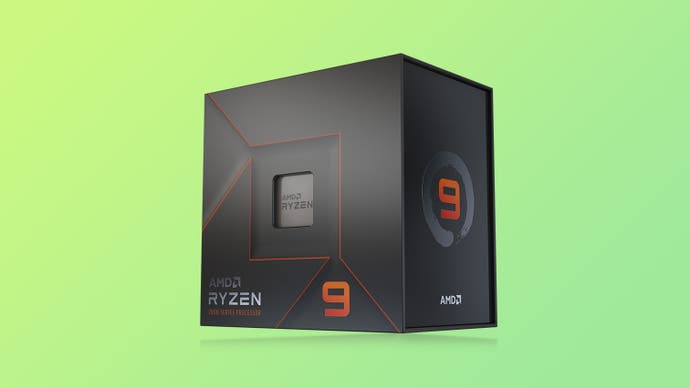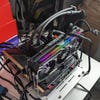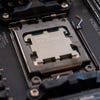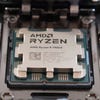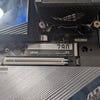AMD Ryzen 9 7950X and Ryzen 7 7700X review: maximal design
The fastest one-CCD and two-CCD CPUs you can get.
Following on from our Ryzen 9 7900X and Ryzen 5 7600X review, it's finally time to look at the two remaining CPUs in AMD's Ryzen 7000 family: the $449/£439 Ryzen 7 7700X, a potential gaming value champ, and the $799/£769 Ryzen 9 7950X, a sixteen-core titan expected to outperform almost every consumer CPU in content creation workloads. We've seen significant price cuts on Ryzen 7000 processors since launch - so are these CPUs worth buying in 2023?
As a quick recap, these Zen 4 processors are profoundly different from AMD's last-gen Ryzen 5000 parts. There's been a shift to a new socket, AM5, with an LGA design that can provide up to 230W of power, as well as a new 6nm I/O die, integrated graphics on all models and support for two key technologies: DDR5 and PCIe 5.0.
These upgrades unlocked some impressive gen-on-gen gains in the case of the 7600X and 7900X, and there's the potential for even greater improvements with the 7700X and 7950X. As AMD uses a chiplet-based design with up to eight cores per CCD, the eight-core 7700X and sixteen-core 7950X ought to represent the maximum performance possible from single-CCD and double-CCD designs respectively - and reports suggest that in some titles, the performance penalty of splitting a gaming workload across multiple CCDs could counteract the gains from having access to a higher number of threads, leaving the 7700X as a CPU of particular interest.
You can see how each of the designs stack up in the table below. With a quoted 13 percent uptick to instructions-per-clock (IPC) and more internal improvements, like an improved execution engine and a better branch predictor, we'd expect the significant boosts to frequency and higher power allowances to translate into some serious performance gains in all manner of workloads, from gaming to content creation. That was certainly the case for the 7600X and 7900X - so how do the 7700X and 7950X fare?
| CPU design | Boost | Base | L3 cache | TDP | RRP | |
|---|---|---|---|---|---|---|
| Ryzen 9 7950X | Zen 4 16C/32T | 5.7GHz | 4.5GHz | 64MB | 170W | $699/£739 |
| Ryzen 9 7900X | Zen 4 12C/24T | 5.6GHz | 4.7GHz | 64MB | 170W | $549/£579 |
| Ryzen 7 7700X | Zen 4 8C/16T | 5.4GHz | 4.5GHz | 32MB | 105W | $399/£419 |
| Ryzen 5 7600X | Zen 4 6C/12T | 5.3GHz | 4.7GHz | 32MB | 105W | $299/£319 |
| Ryzen 9 5950X | Zen 3 16C/32T | 4.9GHz | 3.4GHz | 64MB | 105W | $799/£750 |
| Ryzen 9 5900X | Zen 3 12C/24T | 4.8GHz | 3.7GHz | 64MB | 105W | $549/£509 |
| Ryzen 7 5800X3D | Zen 3 8C/16T | 4.5GHz | 3.4GHz | 96MB | 105W | $449/£429 |
| Ryzen 7 5800X | Zen 3 8C/16T | 4.7GHz | 3.8GHz | 32MB | 105W | $449/£419 |
| Ryzen 5 5600X | Zen 3 6C/12T | 4.6GHz | 3.7GHz | 32MB | 65W | $299/£279 |
To find out, we'll be using the same test system that featured in our previous Ryzen 7000 tests - an ASRock X670E Taichi motherboard, G.Skill Trident Z5 Neo DDR5-6000 CL30 RAM (with Corsair Dominator Platinum DDR5-5200 for supplementary testing) and Asus' RTX 3090 Strix OC for the GPU side of things. Cooling was provided with a 240mm Alphacool Eisbaer Aurora AiO, which is happily compatible with the new AM5 socket.
For storage, we're using three PCIe 4.0 NVMe SSDs to hold all of our games - a 4TB Kingston KC3000, a 1TB PNY XLR8 CS3140 and a 1TB Crucial P5 Plus. Our rig was completed with a 1000W Corsair RM1000x power supply.
Note that we're using an older version of Windows 11 here, as the 22H2 update seems to have resulted in poorer performance for Ryzen 7000 processors. That, combined with a BIOS update for our motherboard, meant retesting the 7600X and 7900X to ensure our results were still valid - and we did see small changes in many games.
Elsewhere, we used an Asus ROG Crosshair 8 Hero for Ryzen 5000 testing, an Asus ROG Maximus Z590 Hero for 11th-gen Intel testing, an Asus ROG Z690 Maximus Hero for 12th-gen testing, and a Gigabyte Z790 Aorus Master for 13-th gen testing; all of these are high-end boards for their respective platforms. DDR4 motherboards used G.Skill 3600MT/s CL16 memory, the sweetspot for DDR4, while DDR5 motherboards used DDR5-6000 CL30 as noted previously.
Before we get into the gaming benchmarks that make up pages two to five, let's set the scene with some quick content creation benchmarks: a Cinebench R20 3D render and a Handbrake video transcode.
As expected, the 7950X is the one to look out for in the content creation stakes, with record high scores in the Handbrake h.264 and h.265 (HEVC) transcode tests - albeit only by a relatively narrow margin over the Core i9 13900K, less than one percent in h.264 and around 10 percent in h.265. In the Cinebench test, a historical strength for AMD Ryzen designs, it's the 13900K that retains the top spot by around five percent, but the 7950X is still significantly faster (~46 percent) than the 5950X, for an impressive gen-on-gen boost.
The 7700X also shows clear progression from the 5800X, AMD's first eight-core design from the Zen 3 generation. Here, both single and multi-threaded scores as tested in Cinebench increase by a little under 30 percent, which would make for a great gaming performance uplift. Handbrake performance is also stronger by a similar margin, although last gen's 5950X still offers better performance overall due to its higher core and thread count - and this older CPU is now cheaper than the 7700X, making it a better choice for content creation if not for gaming.
| CB R20 1T | CB R20 MT | HB h.264 | HB HEVC | HEVC Power Use | |
|---|---|---|---|---|---|
| Ryzen 9 7950X | 798 | 14837 | 105.15fps | 45.10fps | 368W |
| Ryzen 9 7900X | 791 | 11324 | 79.38fps | 33.77fps | 288W |
| Ryzen 7 7700X | 768 | 7894 | 56.69fps | 25.95fps | 266W |
| Ryzen 5 7600X | 750 | 6063 | 44.35fps | 20.28fps | 236W |
| Ryzen 9 5950X | 637 | 10165 | 70.28fps | 30.14fps | 237W |
| Ryzen 7 5800X3D | 546 | 5746 | 42.71fps | 19.10fps | 221W |
| Ryzen 7 5800X | 596 | 6118 | 44.18fps | 19.50fps | 229W |
| Ryzen 5 5600X | 601 | 4502 | 31.75fps | 14.43fps | 160W |
| Core i9 13900K | 873 | 15570 | 104.67fps | 41.20fps | 473W |
| Core i5 13600K | 767 | 9267 | 62.37fps | 26.44fps | 254W |
| Core i9 12900K | 760 | 10416 | 70.82fps | 29.26fps | 373W |
| Core i7 12700K | 729 | 8683 | 57.64fps | 25.67fps | 318W |
| Core i5 12600K | 716 | 6598 | 44.27fps | 19.99fps | 223W |
| Core i5 12400F | 652 | 4736 | 31.77fps | 14.70fps | 190W |
| Core i9 11900K | 588 | 5902 | 41.01fps | 18.46fps | 321W |
| Core i5 11600K | 541 | 4086 | 29.00fps | 13.12fps | 250W |
The power figures are also worth looking at here. We're only testing at the wall, and we do have different motherboards and RAM in play, but you can still see there's a trend towards higher wattage counts in the newer CPUs, with the last-gen 5950X and current-gen 7600X drawing around the same amount of power (~236W) - while the 7950X jumps to 368W. That's still significantly less than the 13900K, which peaked at 473W during the HEVC encode while delivering a slightly worse score. So the new AM5 socket is certainly capable of delivering more power, but in broad strokes it appears that AMD's Zen 4 design is still more power-efficient than its nearest Intel equivalent. That should make cooling slightly less of a concern, and definitely comes as a relief in a time when GPU wattage is also climbing rapidly on flagship-grade cards.
Now, let's get into the fun stuff - the games. We've tested a range of titles, so pick out your favourites from the links below or just hit that next page button to continue the journey.
AMD Ryzen 9 7950X and Ryzen 7 7700X analysis
- Introduction, test rig and content creation benchmarks [this page]
- Gaming benchmarks: Flight Simulator 2020, Hitman 3
- Gaming benchmarks: Counter-Strike: GO, Metro Exodus EE, Black Ops Cold War
- Gaming benchmarks: Cyberpunk 2077, Far Cry 6, Crysis 3 Remastered
- Gaming benchmarks: Memory bandwidth analysis
- AMD Ryzen 9 7950X and Ryzen 7 7700X: the Digital Foundry verdict
